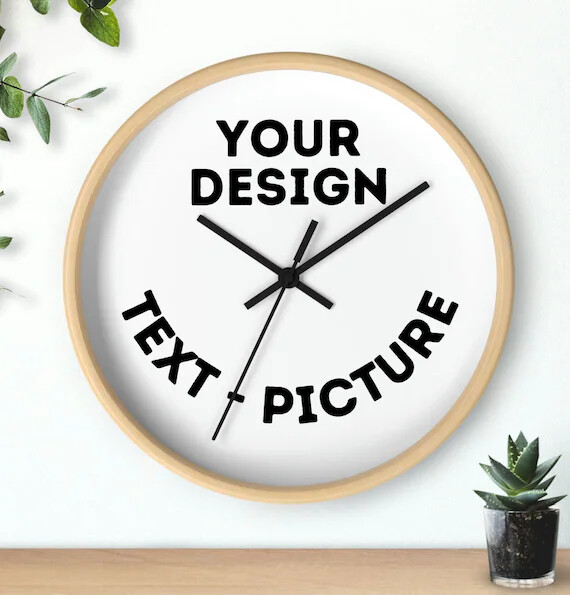
Custom wall clocks sit at the sweet spot between useful tool and brand medium. Unlike flyers or digital ads that fade quickly, a well-made clock delivers daily visibility for years—quietly reinforcing your brand every time someone checks the time. Below is a practical guide to why they work, how to design them, and where they deliver the most value.
High frequency, low intrusion: People glance at clocks multiple times a day; your logo is seen naturally, without interrupting anyone.
Longevity: Quality clocks often remain on the wall for 3–5+ years, spreading costs over a long service life.
Universal utility: Timekeeping is relevant in every setting—offices, stores, schools, clinics, hospitality—so acceptance rates are high.
Always-on brand visibility
Your logo, colors, and tagline live in plain sight—no ad blockers, no algorithm changes, and no media fees.
Cost-effective impressions
One-time manufacturing and placement can yield millions of glances over its lifespan, driving a very low effective CPM compared with disposable promo items.
Professional space branding
Clocks help unify interiors—reception, meeting rooms, production floors—while echoing your brand palette and typography.
Functional gift with high retention
As corporate gifts or trade-show giveaways, clocks are far less likely to be discarded than typical swag, increasing long-term exposure.
Behavior & efficiency support
Time cues improve punctuality for meetings, classes, or shift changes. Add second hands or digital seconds where precise timing matters.
Wayfinding & trust
Clear, reliable time displays reduce “What time is it?” friction for guests and customers, subtly elevating perceived professionalism.
Customization for any campaign
Dials can carry campaign messages, QR codes, or seasonal graphics. Limited editions create urgency and collectability.
Data-driven promotions
Add scannable QR codes or unique URLs on the dial/backplate to attribute visits, redemptions, or app installs to a specific placement.
Sustainability & compliance options
Choose recyclable plastics, responsibly sourced packaging, and compliant electronics (e.g., RoHS). Eco notes on packaging reinforce brand values.
Scalable deployment
From a single office to multi-site retail rollouts, clocks are easy to standardize, ship, and install at scale.
Branding & legibility
Keep the logo within 10–20% of dial diameter; avoid crowding numerals.
Ensure high color contrast between logo, hands, and dial (e.g., dark hands on light dial).
Choose Arabic numerals or clear hour markers for quick read; avoid overly decorative fonts.
For digital models, use large digits (≥1.5" high) and anti-glare lenses.
Movement & acoustics
Sweep (silent) quartz for bedrooms, clinics, libraries, studios.
Step quartz for general office or industrial use where ticking is acceptable.
Radio/Wi-Fi/NTP-sync options for enterprises needing automatic accuracy across sites.
Power & maintenance
AA battery for simplicity; Type-C rechargeable options for modern installs.
If power outlets are available, consider USB-powered clocks to reduce battery handling.
Specify low-battery indicator or scheduled battery-change SOPs for facilities teams.
Materials & finish
ABS for light weight and impact resistance; metal for premium look; wood veneer for warm interiors.
Use UV printing or pad printing for logos; laser engraving for metal plaques.
Anti-UV inks and anti-yellowing lenses extend cosmetic lifespan in sunlit areas.
Safety & compliance
Request applicable certifications for your markets (e.g., RoHS, REACH; FCC/CE for smart models).
Fire-safe packaging and clear mounting instructions reduce facility risk.
Brief: size (e.g., Ø 30–35 cm analog or 7–10" digital), brand PMS colors, logo placement, dial layout, movement type, power mode.
Artwork: supply vector files (AI/SVG) and brand guidelines; confirm bleed/safe areas.
Prototype: approve 1–2 pre-production samples (color, print quality, legibility, noise).
Specs sheet: confirm materials, lens type, hands color, finish, packaging, manuals, mounting hardware.
Tests: running accuracy, sound level (dB @1 m for silent areas), drop/transport tests, colorfastness.
Packaging: brand the box, include message card or QR code for campaign tracking; add spare battery where allowed.
QC & AQL: agree on inspection level and defect thresholds; allow third-party inspection.
Rollout plan: label cartons by site; include mounting kits; share installation SOPs.
QR/URL tracking: unique codes per site or campaign printed on dial/back plate.
Offer codes: tie in a small perk (“Show this code at checkout”) to measure redemptions.
Recall pulse: quick survey (“Which brand was on the meeting room clock?”) to track memory lift.
Operational KPIs: meeting on-time start rate, reduced “what time is it?” chatter, customer feedback.
Corporate & manufacturing: reception, meeting rooms, break areas, production lines (with seconds or shift markers).
Retail & restaurants: visible time reference, seasonal campaign dials, QR to loyalty programs.
Healthcare & education: silent sweep, high-contrast dials, clear seconds for procedures or exams.
Hospitality: consistent brand across lobbies, conference spaces, and staff zones.
Events & trade shows: limited-edition clocks as VIP gifts or raffle prizes.
Q: Analog or digital?
A: Analog feels timeless and decor-friendly; digital excels where at-a-glance precision (hours/minutes/seconds) and visibility at distance are priorities.
Q: Will the logo be readable from far away?
A: Aim for a viewing distance rule of thumb: letter height ≈ viewing distance / 200 (in meters). For a 10 m read, ~50 mm letter height.
Q: Can we keep them silent?
A: Yes—specify sweep movement and request a sound test (≤20–25 dB at 1 m is typically perceived as “silent” in quiet rooms).
Q: What’s a sensible order size?
A: For multi-site rollouts, standardize a spec and order by location. Typical lead times run 15–35 days depending on customization and volume.
Custom wall clocks turn everyday time checks into brand impressions. With the right design (legible, quiet, durable) and a simple rollout plan, they’re a long-life, low-maintenance branding asset that doubles as décor and operational support.